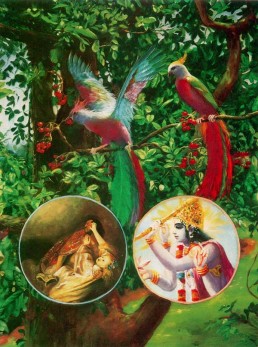Commentary
Continuing the idea that The Lord is the cause for the world of plurality within an individual and for the world outside, Sri Krishna enumerates the qualities of head and heart emanating from Him.
The Lord alone is the cause and the basis of the universe and all its beings. Created beings are endowed with different attributes according to their karma. The law of karma functions in the relative world through the power of the Lord and thus the Divine is indirectly responsible for the pain and sufferings of the world. He is the lord of the world and guides it, though He is unaffected by its oppositions of duality.
Swami Chinmayananda Commentary
The commentary on this verse and the rest, is avaialble for free as:
Kindle eBook
Google Play Book
Apple Books
Adi Sankara Commentary
Buddhih, intelligence-the power of the internal organ to know of things which are subtle etc. Indeed, people talk of a man possessed of this (power) as intelligent. Jnanam, wisdom-knowledge of entities such as the Self etc. Asammohah, non-delusion-proceeding with discrimination with regard to things that are to be known as they present them-selves. Ksama, forgiveness-unperturbability of the mind of one who is abused or assulted. Satyam, truth-an utterance regarding what one has seen, heard, and felt oneself, communicated as such to others for their understanding, is said to be truth. Damah, control of the external organs. Samah, control of the internal organs. Sukham, happiness. Duhkham, sorrow. Bhavah, birth; and its opposite abhavah, death. And bhayam, fear; as also its opposite abhayam, fearlessness. Ahimsa, non-injury-non-cruely towards creatures. Samata, equanimity. Tustih, satisfaction-the idea of sufficiency with regard to things acquired. Tapah, austerity-disciplining the body through control of the organs. Danam, charity-distribution (of wealth) according to one’s capacity. Yasah, fame-renown arising from righteousness. On the contrary, ayasah is infamy due to unrighteousness. (These) prthak-vidhah, different; bhavah, dispositions-intelligence etc. as described; bhuanam, of beings, of living bengs. bhavanti, spring; mattah, eva, from Me alone, [This is said in the sesne that none of these dispositions can exist without the Self.] from God, in accordanced with their actions. Moreover,
The Bhagavad Gita with the commentary of Sri Sankaracharya – Translated by Alladi Mahadeva Sastry
Holy Geeta – Commentary by Swami Chinmayananda
The Bhagavad Gita by Eknath Easwaran – Best selling translation of the Bhagavad Gita
The Bhagavad Gita – Translation and Commentary by Swami Sivananda
Bhagavad Gita – Translation and Commentary by Bhaktivedanta Swami Prabupadha
Srimad Bhagavad Gita Chapter 10 – Verse 5 – 10.5 ahimsa samata – All Bhagavad Gita (Geeta) Verses in Sanskrit, English, Transliteration, Word Meaning, Translation, Audio, Shankara Bhashya, Adi Sankaracharya Commentary and Links to Videos by Swami Chinmayananda and others – 5-Oct

